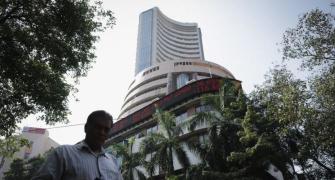Vijay Mallya-owned Kingfisher Airlines, which plans to raise $400 million from private equity investors, may have to settle for structured finance such as sale and leaseback or securitisation of receivables, say private equity experts in Mumbai.
"I am not very sure if Mallya will go for equity, but it's likely to be structured finance. He will not raise money at such cheap valuations. For equity, the markets need to pick up more. He has fought hard to get to that number (stake)," said a senior executive with a private equity player, which has invested in an airline.
The Deccan Aviation stock closed at Rs 88.25 on Wednesday on the Bombay Stock Exchange, down 74 per cent from its all-time high of Rs 335 touched on December 19, 2007. Mallya is merging his unlisted airline firm Kingfisher Airlines into Deccan Aviation after he acquired it in 2007.
UB Group officials were not available for comments but Mallya said in Bangalore that the UB Group is talking to private equity players to raise about $400 million for the airline. With crude oil prices falling and Indian carriers cutting capacity and costs, investors may be keen to come on board.
"We are in discussion with many people as we speak. Many people wrote off the airline industry in India. Suddenly Wilbur Ross appeared and put $80 million into SpiceJet. Kingfisher is a far more compelling proposition than SpiceJet," Mallya told reporters in Bangalore, after an AGM of group firm United Spirits.
Earlier in August, low-cost carrier SpiceJet announced an investment of $100 million from the US-based private equity firm WL Ross & Co LLC and Goldman Sachs Group Inc, with WL Ross investing over $80 million. Investment bankers in Mumbai said that Mallya may find it difficult to rope in investors.
"The outlook has improved with crude falling but it needs to stabilise. Investors are willing to fund a cash burn of $30-40 million a year but not $400-500 million,'' said an investment banker.
Passenger loads fell as airlines raised fares to cope with high jet fuel prices. Short-haul routes served by ATRs have been hit hard as travellers switched back to cheaper modes such as rail and road.
In December 2007, United United Breweries (Holdings), Mallya's holding company, raised Rs 600 crore (Rs 6 billion) through a qualified institutional placement at Rs 1,110 per share. The airline has also been funding itself with sale and leaseback deals, cashing in on attractive aircraft deals it had entered into with Airbus.
A few specialised airlines investors such as Texas Pacific Group, Indigo Partners and Capital International are still keen on investing in India. Capital had invested in Deccan Aviation, which ran budget carrier Air Deccan before Mallya bought it.
"Investors will come in once the outlook becomes more stable. Private equity people like to think they are in control,'' added a private equity manager. Mallya will have to wait for "good times" to return to take investors on board.








